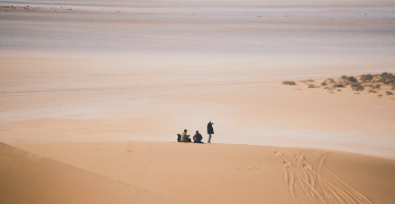Migrants fleeing Afghanistan’s political and economic instability are increasingly falling prey to human trafficking networks in neighboring countries. A recent study by Amu highlights the systemic exploitation occurring in migrant camps designed to house undocumented Afghans, where trafficking networks operate with near impunity.
“Migrant camps, often established to manage undocumented migrants, have become fertile ground for human trafficking networks that exploit the dire conditions faced by residents,” the report revealed.
The “tools of control”
Interviews with 33 individuals across seven Afghan provinces paint a distressing picture. Of those surveyed, 63.6% described trafficking networks’ influence in the camps as “high,” while only 6.1% considered it “moderate.” The tactics used by traffickers are both manipulative and deeply entrenched in the camp environment.
“Traffickers blend in. They may appear to be ordinary workers or even other migrants. They manipulate the situation to exploit those who are most desperate,” explained one interviewee.
Operatives posing as janitors, bakers, or fellow migrants build trust within the camps, offering false promises of escape or assistance. Bribes play a pivotal role, with nearly half of respondents identifying them as traffickers’ primary tool of control.
For Qasim, a former camp resident, the constant financial desperation made him an easy target. He states,
“Inside the camp, everything revolves around money. If you don’t have it, even basic necessities like food are out of reach,” he said. “A bag of chips that should cost 10 rupees is sold for 50. If you can’t pay, you go hungry.”
However, leaving with traffickers often means stepping into even greater danger. Interviewees recounted,
“They promise escape and a better life. But what they really deliver is more hardship and danger.”
“Even after you leave the camp, traffickers find ways to keep a grip on you. They threaten you, steal your belongings, and manipulate you for their own gain.”
The study also uncovered connections between human trafficking and other criminal enterprises, including narcotics and organ trafficking. Jawad, another victim, described how traffickers operate across multiple illegal industries.
“These networks don’t just smuggle people. They’re involved in drugs and even organ harvesting. I’ve seen people lose everything—their money, their health, even their organs.”
How brutal conditions breeds exploitation
Tightening migration policies, dire economic conditions, and harsh treatment at the hands of local authorities further exacerbate the crisis. Mass detentions, overcrowded camps, and deportations push migrants back to Afghanistan with no resources or recourse, driving many into traffickers’ arms.
Murtaza, a camp resident, describes conditions in the camps are dire—lack of clean water, inadequate food, and unsanitary shelters create an environment ripe for exploitation:
“We received dry bread three times a day, and the shelters were infested with insects. It’s no wonder people turn to traffickers when they promise an escape.”
Many Afghans, particularly those in rural areas, face such severe poverty that 10% actively seek out traffickers to escape their circumstances. Another 7.5% reported that traffickers exploit this poverty, driving people into their networks with little resistance. These individuals are often left with no choice but to embark on what are described as “paths of death,” enduring extreme violence, exploitation, and deprivation along the way.
Survivors’ accounts reveal the horrors of these journeys, from brutal beatings to starvation and exposure to deadly conditions. Victims such as Khyber and Ahmad recount being held hostage, forced to call their families for ransom, and witnessing fellow migrants succumb to the hardships. Women and children face unique vulnerabilities, with some mothers forced to abandon their children in the mountains when the journey became unbearable.
Demand dignified migration policies to end human trafficking
The narratives from Afghan migrants are stark reminders of the consequences of failing to act. It’s time to dismantle the systems that allow such exploitation and build pathways that protect the most vulnerable.
By addressing root causes such as poverty, unemployment, and lack of opportunity, as well as implementing protective migration frameworks, governments and organizations can disrupt the cycle of exploitation.
Take action by joining Freedom United’s Safe Migration campaign to help end human trafficking by supporting policies that treat human beings with dignity and reduce their vulnerabilities to exploitation.







Freedom United is interested in hearing from our community and welcomes relevant, informed comments, advice, and insights that advance the conversation around our campaigns and advocacy. We value inclusivity and respect within our community. To be approved, your comments should be civil.
The only solution against migrant trafficking and irregular migration is a well-working Asylum procedure. Everyone and every populist who fights proper asylum fosters this dark mafia and is part of the heavy crime against humanity. We should write a blog or share in the network to make people aware of the aggrevating development.